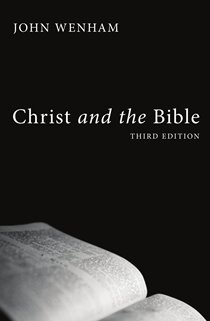Wenham, Warfield, and Inspiration
by Fred G. Zaspel
I recently re-read John Wenham’s Christ and the Bible and was reminded what a helpful work it is. His purpose, as the title indicates, is to demonstrate Jesus’ view of Scripture. The survey of the evidence is excellent, treating in turn Jesus’ view of the Old Testament, his endorsement of the New Testament (ahead of time), the apostles’ understanding of their role as Jesus’ spokesmen, and concluding with an examination of the extent of the canon and the reliability of the Biblical text. Throughout he also answers objections that have been brought against each point under discussion. In the end he provides a very helpful summary of the historic Christian doctrine of Scripture, and he establishes very well his point that following Jesus demands that we accept also his view of the divine inspiration of Scripture. It is a truly valuable resource for anyone approaching the topic.
There is, however, a curious observation that arises from his Introduction. Here at the outset Wenham gives laudatory mention of Warfield and the momentous event he was in the history of the doctrine of inspiration. Of course. But then he goes on to claim that the argument he (Wenham) gives here (in Christ and the Bible) is substantively new. Specifically, what he has in mind is the old problem of establishing the authority of Scripture by the authority of Scripture: if we say we believe that the Bible is our supreme authority because the Bible claims to be the supreme authority, is that not reasoning in a perfect circle?
Wenham’s “new” argument circumvents this problem, arguing that quite aside from the presumption of inspiration and on any reading of the historical documents, we must say that Jesus believed and taught the doctrine. And this is the ground on which we believe in inspiration – Jesus taught it.
All that is very good. But what is interesting is that this is not new at all. Warfield emphasized this a century ago. He stressed it at several points in his works and especially in his “The Real Problem of Inspiration” – we believe in inspiration because Jesus (and his appointed apostles) taught it.
Two observations arise from this. First, as it has been said so many times, anything in the last century written on the doctrine of inspiration is but a footnote to Warfield. It is very difficult indeed to add to the massive exposition and defense of the doctrine he provided.
Second, Wenham illustrates a point I have made elsewhere — that many today seem to reference Warfield without really reading him. No reading of Warfield could have missed this point, but Wenham thinks his argument is new. In fact, Wenham’s argument does offer more detail on several points, sometimes considerably so, but there is nothing substantively new at all.
This second observation came to mind again while reading Wenham’s chapter on the canon. He states disagreement with Warfield but does not seem to have considered Warfield’s argument very thoroughly.
Honest, I am not on a campaign to see that every Christian read all of Warfield (even though in the back of my mind while I write this I’m thinking you’d be better for it if you did!). And Wenham’s work is excellent. But I am a confessed Warfield aficionado. And we might do well to remember that when it comes to studying the doctrine of inspiration Warfield already said it, and he very likely said it better. Our study of this major point of doctrine just is not done until we have read Warfield ourselves. In God’s good providence, this was Warfield’s gift to the church, and we neglect him to our own loss.
Fred G. Zaspel
Buy the books

Christ And The Bible